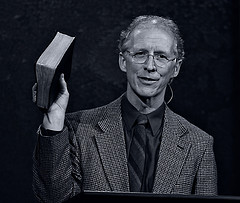 I was walking across a bridge one day, and I saw a man standing on the edge, about to jump off.
I was walking across a bridge one day, and I saw a man standing on the edge, about to jump off.
So I ran over and said “Stop! don’t do it!”
“Why shouldn’t I?” he said.
I said, “Well, there’s so much to live for!”
He said, “Like what?”
I said, “Well…are you religious or an atheist?”
He said, “religious.”
I said, “Me too! Are you Christian or Buddhist?”
He said, “Christian.”
I said, “Me too! Are you Roman Catholic or Protestant?”
He said, “Protestant.”
I said, “Me too! Are you Presbyterean or Baptist?”
He said, “Baptist!”
I said,”Wow! Me too! Are you Baptist Church of God or Baptist Church of God in Christ?”
He said, “Baptist Church of God!”
 I said, “Me too! Are you original Baptist Church of God, or are you Reformed Baptist Church of God?”
I said, “Me too! Are you original Baptist Church of God, or are you Reformed Baptist Church of God?”
He said,”Reformed Baptist Church of God!”
I said, “Me too! Are you Reformed Baptist Church of God, using the red hymn book from 1879, or Reformed Baptist Church of God, using the blue hymn book of 1915?”
He said, “Reformed Baptist Church of God, using the blue hymn book of 1915!”
I said, “Die, heretic scum”, and pushed him off.
I realize that this story (thankfully fictitious) would probably be more appropriate for a Monty Python humor sketch than a blog article on a Christian website, but I use it here to make a larger point. We Christians need instruction on the subject of true Christian unity. Please allow me to explain by starting with this ancient historical quote:
“In essentials, unity; in non-essentials, liberty; and in all things, charity.”
In the Church, Christians hold differing views about important, yet non-essential matters. Let me explain. There are doctrines in the Bible that while very important, are not essential to salvation. For instance, whether or not someone believes in the baptism of infants or whether or not God still heals today, I think are important issues; yet, what someone believes about these is not essential to someone being included or excluded from the kingdom of God. Someone is not a “false teacher” who takes a different position on these issues. The same is true for doctrines such as whether someone is “pre-trib,” “mid-trib,” or “post-trib” in their belief about the end times, or for those who take different positions on the millennnium – “a”, “pre” or “post.” Sincere, godly, dedicated believers believe different things about these issues, but it does not mean that one person is saved and another damned because they have a different view.
Doctrine divides! It divides truth from error. It divides the true teacher from the false teacher; the spirit of truth from the spirit of error; and the true Christ from the Anti-Christ. Yet as Christians, what unites us, vastly outweighs what might divide us. In the essentials, such as the Deity of Christ, the Trinity, justification by grace alone, through faith alone, because of Christ alone, etc., we need to be in agreement. As this quote, which historically has been attributed to Augustine states, “In essentials, unity.” We cannot compromise on these major issues of the Gospel. These are non-negotiables. In fact, to depart from these doctrines is to depart from the Christian faith itself.
Knowing the difference between the essentials and the non-essentials takes a great deal of maturity at times. Christians have been notorious for dividing over such minor issues, and the Body of Christ has been less effective because of it. Our track record is not at all good, in this regard. The boundary lines are drawn by the Gospel itself. We must be united in the Gospel for true Christian unity to exist. But where this does in fact exist, let us celebrate it, standing united for the cause of Christ.
Augustine went on to say, “in non-essentials, liberty.” Christians need to allow their brothers and sisters room to hold differing positions on some issues without breaking fellowship with them. This takes a great deal of maturity. Church history shows us that the Body of Christ as a whole has not been very good at this. We tend to disassociate ourselves from Christians who don’t have the exact same understanding of the spiritual gifts, the end times, Divine election, or even when a child is old enough to be baptized. These are important issues, of course. In fact, there is only one true biblical position on these issues – not everyone is right! There is a right answer and a wrong answer. In fact, there are many wrong answers. God is not confused on these issues, even if we are. We should note too that God doesn’t ever give us the right to believe false doctrine. If there are two people with differing positions on an issue, at least one of them is grieving the Lord in terms of what they believe. Yet the point is that both people can disagree on a certain issue with a fellow brother or sister and yet believe the best of the other – that if the other person could be convinced by sacred scripture concerning the truth of the matter, they believe the other one would change their beliefs immediately. But disagreement on these important but non-essential things should not divide us, if we are united in the Gospel.
This is not to minimize doctrine. In a local Church it is entirely right for eldership to state in categorical terms, just what it is that they believe scripture to be teaching. This is part of their function as elders. Yet, in doing so, we must all recognize our fellow brothers and sisters in the entire Body of Christ, and know that God embraces many who hold differing positions to us on some issues.
The scripture commands us to “maintain the unity of the Spirit” (Eph. 4:3) “until we all come to the unity of the faith.” (Eph. 4:13). For God to tell us to maintain something, it shows clearly that we already have possession of it. For instance, we cannot maintain a photocopier unless we first have the photocopier in our care. We are called to maintain the unity of the Spirit in the bond of peace. This we are to do “until we all come to the unity of the faith.”
Augustine’s quote ends by saying, “in all things, charity (or love).” Let love be chief amongst us, His people. May we unite for the sake of the Gospel, while God, the Holy Spirit continues to lead His people into all truth.
 “Read the Beatitudes, and there you have a description of what every Christian is meant to be. It is not merely the description of some exceptional Christians.
“Read the Beatitudes, and there you have a description of what every Christian is meant to be. It is not merely the description of some exceptional Christians.
 I was walking across a bridge one day, and I saw a man standing on the edge, about to jump off.
I was walking across a bridge one day, and I saw a man standing on the edge, about to jump off. I said, “Me too! Are you original Baptist Church of God, or are you Reformed Baptist Church of God?”
I said, “Me too! Are you original Baptist Church of God, or are you Reformed Baptist Church of God?” By John Piper: Website: www.desiringGod.org. Email:
By John Piper: Website: www.desiringGod.org. Email: